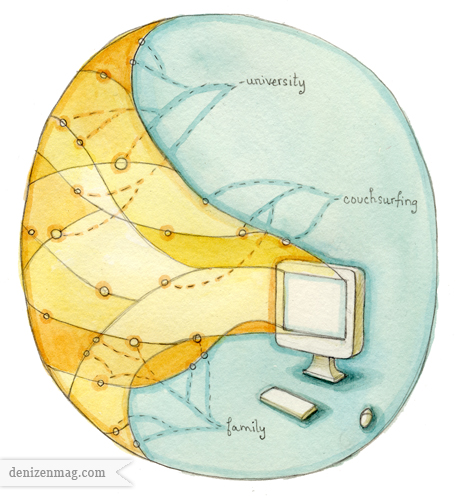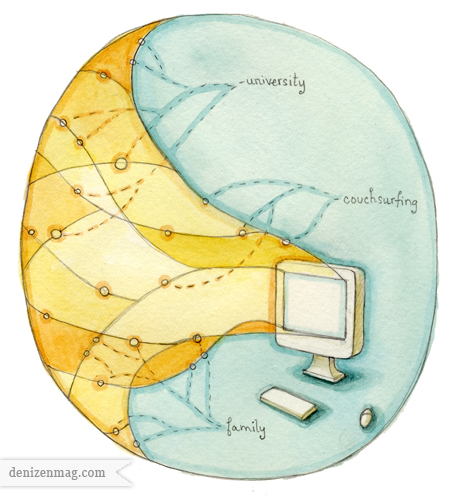Illustration for Denizen by Mary Lundquist
Until I moved to Melbourne in 2008, I lived my entire life in California, moving within a 12-mile stretch of highway near San Francisco. Up until that point, I had travelled, but never viewed myself as a mobile person.
It was in Melbourne that I discovered CouchSurfing.org, a social networking website that connects travellers – “surfers” – with locals – “hosts” – around the world. Members use the website to engage in cultural exchange and develop new connections, facilitating diverse, ‘real life’ mobile experiences for its members.
CouchSurfers doesn’t connect random strangers, but instead, like-minded strangers who share a passion for travelling and unique experiences. Although “surfers” save money on accommodations, they more often than not choose to stay with a “host” to experience a city and its culture in a way other tourists may never get to know – through the eyes of a local.
For most people I’ve talked to, the idea of CouchSurfing seems quite crazy. Specifically, issues of trust arise. How do you know your host is safe? How do you know the person sleeping on your couch is not a threat?
Although these are legitimate concerns, there exists a feeling of mutual trust between hosts and surfers that is inexplicable.
I met a good friend, Sam, through the website. He made a request to stay a weekend with me in Melbourne. One of the first things I did after introducing myself was to give him a spare key to the house. That very same day he helped my boyfriend plant herbs in our garden. It never occurred to us that he could be a threat. I feel that CouchSurfers, as a community, facilitates trust between hosts and surfers because we are willing to risk putting ourselves in both situations – hosting and surfing.
Although my experience with CouchSurfing is limited, I found it such a fascinating concept that I analyzed it in my Masters thesis at University of Melbourne. My thesis became an exploration of a specific form of mobility found on CouchSurfing.org with specific mobile people, CouchSurfers.
In my research, I found that mobility has become a significant part of people’s identities, and the way we use CouchSurfing.org and the way we travel is an extension of an already mobile identity held by Third Culture Kids, dual citizens, immigrants, etc.
Although I’m not a TCK, having immigrant parents meant I was culturally raised Asian, but viewed myself as Asian-American. My identity is always hyphened. When I travel, there is a tension between my mobility – where I go – and my identity – who I am. In Asia, I look Asian, but somehow I’m not. In Western countries, I’m Western, but somehow I’m not.
One TCK subject I interviewed for my thesis, Stephanie, articulated this same tension. Her mobility – living like a global nomad – shaped her identity. It made her feel like she didn’t belong to any one place or culture.
“Even though I’ve lived in Asia my entire life, I’ve never clicked with the local culture because I always lived in the international community,” Stephanie said. “My culture is very much international and what I have adopted from different [international] friends.”
As I see it, CouchSurfing.org could help mitigate the tension between mobility and identity for many TCKs. CouchSurfing offers an international community that allows TCKs to socialize with other global nomads. TCKs who settle down can obtain social support from the local CouchSurfing community as Stephanie did.
Stephanie moved to Melbourne to complete her master’s degree, but found it difficult to socialize with her university peers. “I didn’t feel like I clicked with them,” she said. “I come from a very international, transient community”.
A friend from Malaysia introduced Stephanie to CouchSurfing, and after being invited to a CouchSurfing event, she got to know some locals and felt welcomed and part of their community. “That was what I missed, that whole international feel,” Stephanie said.
CouchSurfing, with its focus on travelling and community, is useful for understanding the relationship between mobility and identity. It provides a platform through which mobile people can participate and contribute to discussions about travelling and multiculturalism. CouchSurfing allows its members to express their identities and be a part of a mobile culture that is always on the move.

